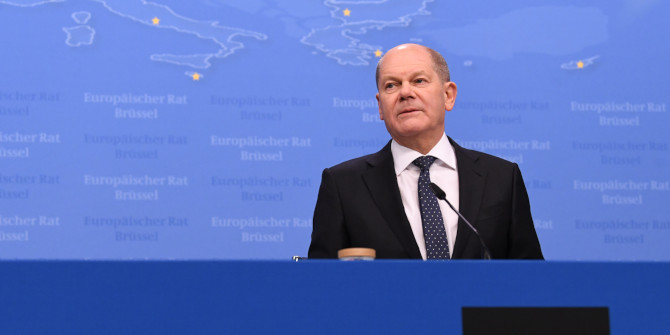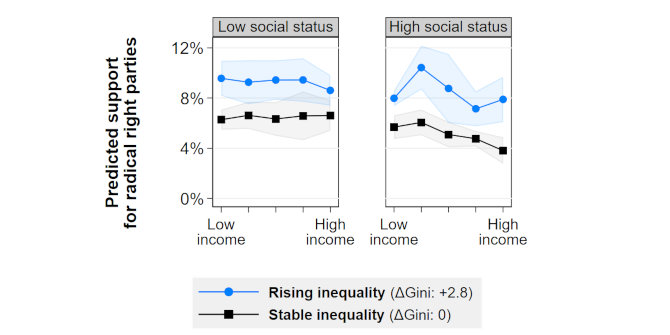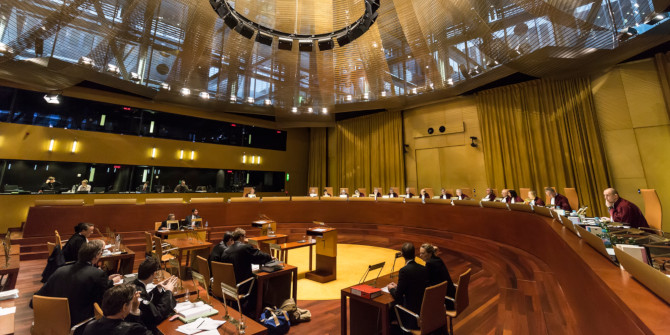The Covid-19 pandemic has required citizens to adhere to strict restrictions to help tackle infection rates. Drawing on a new study, Michael Mintrom, Maria Rost Rublee, Matteo Bonotti and Steven T. Zech compare the effectiveness of the policy narratives used by German Chancellor Angela Merkel and British Prime Minister Boris Johnson to encourage citizens to follow their advice.
While states had broadly the same information about Covid-19 at the start of the pandemic in early 2020, they responded in different ways, and infection and death rates have varied dramatically.
In a recent study, we determined that these differences depended in part on the ability of state leaders to successfully craft effective policy narratives as the public faced new challenges in an unfamiliar situation. The controversial measures implemented by governments to manage the crisis required the public to adhere to context-specific restrictions.
Often, these curtailed individual freedoms in ways that did not fully align with a liberal democratic society’s vision of itself. It was up to government leaders not only to make decisions on behalf of their citizens, but also to clearly communicate and justify these decisions to the public in ways that explained what was happening, why it was happening, and the role state and society needed to play.
In our study, we compared the policy narratives of Chancellor Angela Merkel in Germany and Prime Minister Boris Johnson in the United Kingdom. Germany and the UK are similar countries on a range of measures – population size; GDP per capita; healthcare expenditures per capita; and aspects of their governance. However, their early responses to the crisis (i.e., through July 2020) resulted in starkly different total numbers of confirmed Covid-19 cases and death rates per 100,000 people.
Both Angela Merkel and Boris Johnson crafted narratives designed to appeal to their citizens and justify their decisions during the crisis. The way these two leaders localised and justified their responses to the pandemic can help us understand how future leaders might employ localisation and public justification to better effect in times of crisis.
Localisation
Narrative localisation highlights that individuals do not simply hear what leaders say and accept or reject their words. Rather, they ‘localise’ what they hear – comparing, contrasting, and sometimes integrating it with their own pre-existing ideas regarding the policy issue at hand. This can lead to unexpected interpretations and reactions.
Leaders can pre-empt this by crafting their narrative to resonate with positive local contexts, such as links to proud historical moments, key cultural themes, and deeply held moral beliefs. Furthermore, citizens, in all their diversity, must be able to see themselves in the narratives that leaders employ to justify their policy decisions. This means that those narratives must be broadly applicable across society and able to traverse partisan lines.
With the German government enacting a number of restrictions on citizens’ rights and liberties, including on freedom of movement, critics would inevitably link Merkel’s policies back to WWII Germany. Merkel effectively countered this negative localisation by raising Germany’s war history directly, and then emphasising the differences between her policy narratives and those of that time.
Merkel helped the German public connect her policy narrative back to hard-won post-WWII liberal democratic rights and freedoms (such as press freedoms), as well as to the importance of transparency and data-driven policy decisions, arguing that these are critical elements for ensuring restrictions remain as limited as possible. Merkel also offered up the image of a collective hero – incorporating government and citizens alike – working together, guided by the moral that deliberate use of science would keep losses to a minimum and thus help protect fundamental human rights.
In the UK, Boris Johnson also had a consistent narrative referencing Britain’s recent history to draw in the public and create a sense of shared responsibility. In Johnson’s narrative, it was the individual and the citizen who would win the ‘war’ against Covid-19, with less of an emphasis on the actions of the government.
This narrative reflected Conservative rhetoric in the UK. For a long time, Conservative leaders have emphasised that citizens, rather than the state, are the responsible parties in public life. This point is familiar within the local context, but it is also controversial as only a part of the population is likely to agree with that particular political ideology.
In addition to the issues concerning the content of the narrative itself, Johnson also sent inconsistent messages that further weakened his narrative in the eyes of the British public. While often speaking about the importance of individual responsibility and adhering to government recommendations on social distancing and hygiene, he publicly undermined that message through his own actions, such as shaking hands during a hospital visit. When conflict between messaging and actions occurs in narratives, the public is likely to be confused about how to interpret the narrative, and positive narrative localisation is less likely.
Justification
Public justification should legitimise policies in the eyes of the public, even when those policies are controversial. Public justification, like localisation, contributes to a ‘shared understanding’ of what is happening and why. Public justifications should be clear, and they should also be consistent.
In Germany, Chancellor Merkel repeatedly called for caution, even as case numbers and death rates were decreasing. On multiple occasions, Merkel gave public justifications for keeping stringent restrictions in place. These justifications took two forms.
First, in the early days of the pandemic, she gave a clear explanation of the highly contagious nature of the virus. Second, Merkel repeatedly emphasised her commitment to following advice based on scientific expertise in her public statements. The consistency of these justifications and their reflection in Merkel’s actual policy decisions contributed to a persuasive narrative that the German public could follow, understand, and broadly accept.
In the UK, Boris Johnson also offered justifications for his government’s actions in response to the pandemic. He argued for the importance of saving lives, individual responsibility, using evidence to guide action, and getting back to business faster. This broad range of justifications ran alongside an equally broad range of public policy measures and decisions to stay open, to lockdown, then to reopen as cases and deaths reached new heights.
However, Johnson’s appeal to a pre-existing factional (rather than broadly accepted) narrative undermined the public justification for his policies. In other words, his justifications were not truly public. Moreover, the inconsistency between the narrative and some of his own behaviours and policies created confusion among the British public. Crucially, it did not engage the public. Arguably, this helped contribute to worse policy outcomes.
When widespread compliance with government policies is crucial for achieving public health outcomes, the failure of a policy narrative to make sense in a local context and contribute to public justification can have significant material consequences and long-term repercussions. Given this, we suggest that public leaders and their advisors can learn a great deal from the contrasting cases of how Angela Merkel and Boris Johnson handled this crisis.
For more information, see the authors’ accompanying paper at the Journal of European Public Policy
Note: This article gives the views of the authors, not the position of EUROPP – European Politics and Policy or the London School of Economics. Featured image credit: Andrew Parsons / No 10 Downing Street (CC BY-NC-ND 2.0)





